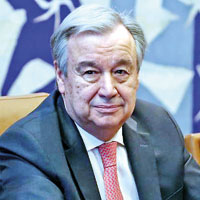Sunday Times 2
A billion here, a trillion there and the UN is looking for real money for its development agenda

UN Chief Antonio Guterres
UNITED NATIONS (IPS) – A Republican US Senator of a bygone era was once quoted as saying “a billion here, a billion there, and pretty soon you’re talking about real money.”
And, not surprisingly, at the UN, when it comes to the implementation of its 17 Sustainable Development Goals (SDGs), the financial targets keep moving – from millions into billions, and eventually from billions into trillions of dollars.
At a ministerial meeting in September, Secretary-General Antonio Guterres thanked member states for their pledges and commitments at three high-level summit meetings: on Climate Action, on SDGs and on Financing for Development (FfD).
“But to make serious progress,” he told the ministers, “we need to fill the financing gap for SDGs—some $1.5 trillion dollars per annum.”
According to the 2014 World Investment Report by the Geneva-based UN Conference on Trade and Development (UNCTAD), the financing gap to achieve the SDGs in developing countries is even higher — and estimated to be around $2.5 – $3.0 trillion per year.
The SDGs include the eradication of extreme poverty and hunger, universal health care, quality education, clean water and sanitation and a green economy, among others– to be achieved worldwide by a 2030 deadline.
At the same time, Guterres has said there is a need to replenish the Green Climate Fund (GCF) to meet the commitment to mobilize $100 billion per year for climate action, including mitigation and adaptation in developing countries, by next year.
But at the GCF Pledging Conference in Paris October 24-25, 27 rich nations pledged only $9.8 billion to the Fund.
And one of the world’s richest nations – the United States—made no pledges, and is unlikely to do so, since it is planning to withdraw from the 2015 Paris Climate Change agreement.
But with deliveries falling short of pledges, off and on, Guterres is looking for concrete commitments—and real money.
In his annual report for 2019, the secretary-general was unequivocally clear that “at the current pace, we will not reach our targets” –unless there is much greater urgency and ambition, including enhanced international cooperation, private-public partnerships, adequate financing and innovative solutions.
With a huge shortfall in funding, he has now turned to the world’s business and private sector for investments.
On October 16, Guterres launched the Global Investors for Sustainable Development (GISD) Alliance, described as “a UN’s first-of-its-kind grouping comprising 30 high-powered business leaders from all over the world.”
In an interview with IPS, Navid Hanif, Director, Financing for Sustainable Development Office at the UN’s Department of Economic and Social Affairs (DESA), said these are men and women who have responded to the Secretary-General’s challenge to find ways to rapidly and significantly increase the private sector’s contribution to addressing sustainable development, including achieving the SDGs.
Essentially, he pointed out, the Alliance will help provide leadership in mobilising resources from the private sector for sustainable development.
Asked why an alliance was needed, he said: “I can do no better to explain it than the GISD Alliance Members themselves, who issued a Joint Statement at the official launch at the UN. ”
They said that investment in SDGs “is not happening at the required scale or speed. While investment into sustainable development has become increasingly important, there is more work to be done to bring this long-term and inclusive approach into the mainstream.”
They went further, adding: “Businesses need to develop local solutions and projects; investors need to step up their support with financing; and policy makers need to set an enabling framework,” said Hanif.
These are powerful statements by the world’s top investors and banks. By articulating so clearly what this challenge has been, they have also set out to answer the questions of how can this status quo change, and how can it be done as soon as possible?
Asked about the track record of big corporations and international banks, Hanif said there were many examples — Citigroup, Standard Chartered Bank, Enel, and ICBC – are involved in major sustainable infrastructure projects, including in developing countries.
In fact, most of the CEOs in the Alliance are engaged in other UN initiatives, and they are coming together under the GISD umbrella to go above and beyond.
But the Alliance has also been formed in acknowledgment of the fact that without a scaling up of finance and investment from the private sector, including big banks, pension funds, and other investors, the Global Goals will not be achieved, because what is available from public sources will not be enough.

